Martina came down from their second-floor Swift Industries‘ space, greeted us at the front door of the huge old building, and began her space tour by showing and telling us about the whole building—and all the community members and other businesses using the shared space first, and then her own future space in the building—before we heard about the current Swift Industries space.
Mmmm, context. My kind of gal. Thank you Martina. Click here for the space tour or just keep reading for the interview.
For this interview, Martina (bless her heart) asked the first question, which, sadly, I managed not to get on tape because, well, I’m learning. But her question must have been about our work for the Different Office web site itself because the first thing on the audio tape is me saying…
Lori: It’s a completely collaborative process. And Bas, my partner, lives in The Netherlands. So we have, ah. Our own Different Office is a virtual thing.
Martina: Yeah.
Lori: That’s really fun. And his wife Simone is also a photographer. And he and I are both bloggers. So it kind of worked out nice because we have a web site on which we create stories, we write stories, create videos, and then we have photos—crappy photos by Bas and Lori and amazing photos by Daniel and Simone.
Martina: Uh huh. [She laughs.] Got it!
Lori: A mix of professional beautiful photos and crappy beautiful…
[Two people come in and ask Martina a question. She quickly helps them—they need a signature to drop something off for another person in the shared space who isn’t in at the moment—and then she returns to us.]
Lori: You know what. Fisher has some questions. And since you have to leave at 10:45…
Fisher: We’re meeting on Wednesday.
Martina: Totally. [We all laugh]
Lori: Oh, ok, then I’ll just ask.
Fisher: I’ll jump in if I have one. [Martina laughs] But we’ve got some time on Wednesday to talk about other stuff.
Lori: How did this come to be your work space? Or what’s your story of getting here, to this work space?
Martina: So, really, specifically to this space. As I mentioned, we started Swift Industries at home. And that was really wonderful but also pretty challenging as the business grew. And I feel like the whole, the company has been pretty crazy in that I’ll start to feel bold enough to say something that I want, and then I’ll say it, and things manifest. It’s just saying it out loud. And I’m not, kind of, a “woo” guy. Right? But I was like “Jason, we need to start looking for a studio space.” And then, like, 10 days later I was at Madison Market and I saw Armel’s husband Sean—whom I had met through a college friend a year before, in passing. And he was like “We just moved into this warehouse space in Ballard. We’re looking for tenants. Looking for people who are engaging in their craft to make a living, specifically. And it would be awesome if you want to come and check out the space.”
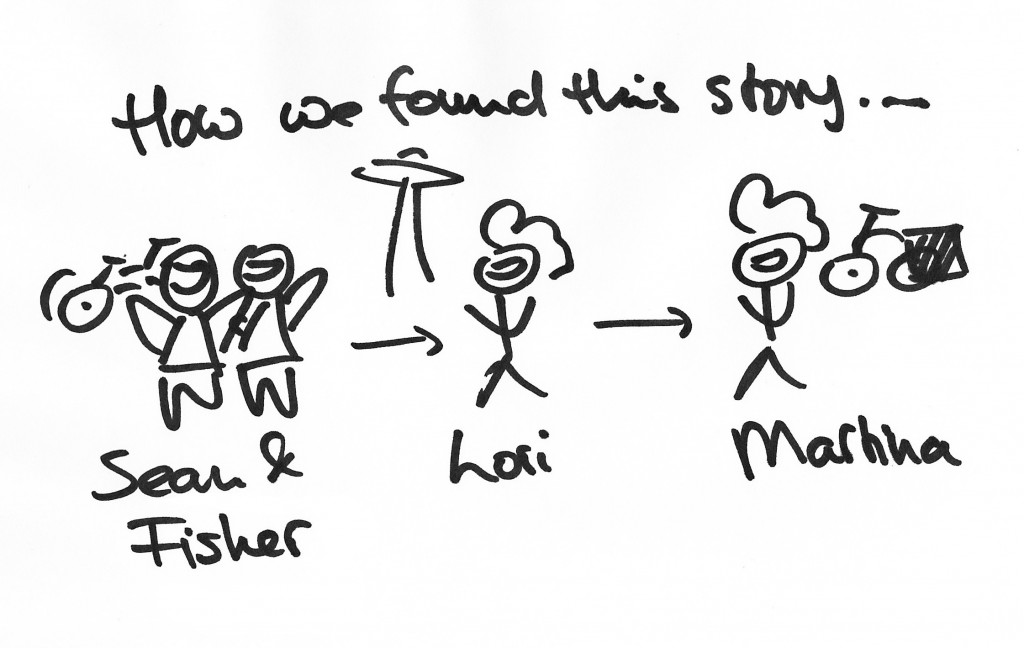
Lori: Madison Market? Where’s your neighborhood? Where do you live?
Martina: Up on Capital Hill.
Fisher: That’s the Central District.
Martina: Yeah. Central District. [Fisher laughs]
Lori: We live at 21st and Union!
Martina: We’re on 20th and Union!
Lori: Holy crap, we’re neighbors! [Fisher laughs]
Martina: Totally!
Lori: Wow! I live right across the street from Kate and Kevin, who own the Central Cinema. About half a block south of Central Cinema.
Martina: And I live in Alex Kostelnik’s old house. The owner of 20/20 Cycle.
Lori: Oh! Yeah, yeah, yeah.
Martina: Right around the block.
Lori and Martina: Cool! Totally!
Lori: Yesterday. Ah, I keep discovering. I think I have cool neighbors. And then I learn I have even cooler neighbors. It’s extraordinary who lives in the Central District.
Martina: Yeah. There’s some really amazing folks. We’re actually having a block party on Tuesday. I’m sure that it would be really lovely to have other people from the neighborhood come. We’re just having like a BBQ in the evening.
Fisher: For the Night Out? The 7th?
Martina: Yeah.
Lori: Ours is that night too.
Fisher: Everybody’s doing theirs on the 7th. Maybe Sean and I’ll just make 500 popsicles. The stuff on Jackson’s happening that night too.
Martina: What’s that?
Fisher: The Jackson Commons people. Knox Gardiner, and this other guy, who lives down in Coleman. He’s starting a big new effort called Jackson Commons. He’s awesome. He’s a UX/UI designer, just freelances. But he’s been doing a lot of tactical things along Jackson to make it a more livable street. He’s got one of Colin’s trailers.
Martina: What area of Jackson is it?
Fisher: Ah, let’s say between MLK and 14th.
Martina: OK.
Fisher: So the big thing he’s really focused on is the 23rd Ave Promenade. Where Red Apple grocery is. The developers in Texas have begun to suggest that they’re thinking about what’s going to happen in that space.
Lori: I’ve seen those. Does he have drawings of turning it into a farmer’s market? I’ve seen those somewhere.
Fisher: Yeah. Likely on Facebook. I probably told you to follow him. [We laugh together]
Lori: That’s why I was thinking “Hey, that’s starting to sound familiar!”
Fisher: So he’s got one of Colin’s trailers. He loads up a café into it. Goes and sets up umbrellas and chairs and hangs out and sees people show up. He’s got a whole bunch of other things going on. He’s building a person-powered street car. I don’t know if he’s actually going to finish that one—it’s a BIG project. He’s doing a cake box. Going into a vacant lot and setting up a free cake stand. What’s the other one he’s doing? Oh! They’re doing a kind of cool project where he’s got a lady that teaches beginning architecture to bring her students to a draw-in session where community members can come, sit with a drawing student, talk about their vision of Jackson street.
Martina: That’s awesome!
Fisher: Watch them draw it and then have a dialog between how designers take what they hear and then come up with something, so that the community can then understand as they’re going through that process moving forward, how to be more explicit in talking with designers. So they can actually get what they want.
Martina: That’s amazing.
Fisher: Part of the frustration is people say “Oh, this is what we wanted!” and the architects come up with it and when it’s built they’re like “It’s not what we wanted!” [laughs]
Martina: Totally. If there’s even that dialog at the beginning.
Fisher: Yeah. So I think his idea is to catalyze people early on to get experience with 23rd Ave Promenade. There’s nothing the community can really do at this point because it’s already zoned. Maybe get some things they want. But overall, it’s going to happen the way the developers want it to happen. He’s not going to have a lot of say overall. He sort of knows that. But I think if he can get enough people experienced and talking, working with the city, then next time a big project comes along.
Lori: Well, even recognizing that you actually could have a voice. You start to band together, talk about it, is enough. Even if. Even the act of floating drawings of what people in the neighborhood want at the developer, is a huge win. Just the fact that that’s been done as a community, even if nothing comes of it.
Martina: Yeah. That’s really cool.
Lori: I’ll have to go meet him. Find one of his projects.
Fisher: He’s totally not what you’d expect, either.
Lori: That’s my favorite kind of people. People that completely break what you’re expecting.
Martina: Totally.
Lori: Ok, back to the question of how this came to be a work space. You manifested it into existence! I no longer believe that’s woo woo. That happens so often, in my work experience—and in the stories I gather—that actually happens.
Martina: It’s kind of been just the story of this company. It’s pretty crazy.
Lori: How long have you been here in this space now?
Martina: Just over a year. And now I’m just starting to understand it as you get out of a project what you put in, and that’s all part of it. It’s like, my boldness, and courage to be defining things for myself as a self-employed individual. And then being able to articulate what I want. That’s like one of the hardest things for me. To fess up, and be like, “Wait. This is what I want. These are my goals.” Because sometimes I just feel shy about what I want. Or, I don’t know, sometimes it’s not so clear. And things change, too, as I’m getting older. So yeah, it’s been really interesting.
Lori: What work is done in this space?
Martina: In this space, as in the Swift Industries space, we manufacture bicycle bags, mostly panniers, but we have bicycle bags of all varieties, most specifically for commuting and travel.
Lori: What are panniers?
Martina: Panniers are the bicycle bags that go onto a bike rack of a bicycle. And they’re often seen, again, in commuting. But are mostly linked to bicycle touring and travel. So we make them from start to finish in this space. There are a few things. Well, actually, the hooks are made here. Our hardware and stuff is sourced to elsewhere. But for the most part things are really manufactured here.
Each sewer takes on a project from start to finish. So it’s not that I put on labels all day. If I start a project, I take it off of the order board, I cut the fabric to each customer’s specifications, so there’s an element of custom that’s involved in each project. Then I take it to the sewing table and I sew it. And at the end of that process I do all of the construction. There’s hardware, hooks, backboards, nuts and bolts that go into each set of bags. So I do that, and then I box it and I ship it. And that’s how it works for every single bag. So when Sonia makes a bag, that’s her process as well.
We take on all of the business side of the business here too. So we do all of.
Lori: When you say we, who’s we?
Martina: Myself and my husband Jason. He does some of the work for us. He used to sew, but he’s a full-time bike mechanic and has started to focus on doing the accounting for the business.
Lori: I’m going to go off script. Where can I get your bags here in Seattle? [We laugh together]
Martina: You can get them here. We have people come and design their bags, and then it’s about a month that we need to complete the order. Or, you can go to Free Range Cycles in Fremont. A lady-owned bicycle shop, which is pretty significant. There’s only two in the city.
Fisher: In San Francisco there’s something coming up in a month, right?
Martina: That’s right. And at 20/20 Cycle, in the Central District, and Back Alley Bikes in Pioneer Square. Those are the three vendors in Seattle. But we have 12 shops that carry our goods throughout the nation.
Lori: That was just a personal question thrown in amongst the others. You said you’ve been in the space for over a year now, what’s your favorite story from the space so far? Your most fun memory?
Martina: Oh, gosh, I don’t know! I have to say that, like, there’s nothing outstanding as one specific memory, although Pedaler’s Fair, that would definitely take the cake.
Lori: Pedaler’s Fair?
Martina: I’ll explain that in a second. What I was going to say is simply that I’ve never had a work environment in my life that I loved going to every day. And I sincerely have not taken this space for granted, even one day of this year.
Lori: Yeah.
Martina: It is just sooo fun to be here. I think in part because it’s mine, and I have been able to, you know, make the space work for me as a crafter. But also because of the culture of the building.
But this last year, in April, Swift Industries, and Go Means Go, which is a bicycle blog here in Seattle. And a company called Babecycle—the three of us put on a holiday—no, not a holiday—a bicycle craft fair.
Lori: That was Pedaler’s Fair.
Martina: That was Pedaler’s Fair. Yeah.
Fisher: Kind of like Urban Craft Uprising for bikes?
Martina: Totally. It was all bicycle-specific and exactly that kind of event in nature. This first year, I actually wasn’t one of the organizers, Jason was the one who organized from Swift’s end. But they like, really, specifically decided to invite Washington State crafters and people who were making things specifically related to bicycles. And it ended up looking like silk-screen t-shirts, through a handful of other bag manufacturers, all the way through frame builders.
Lori: Where was it at?
Martina: It was here! In this building. Yeah, so we took the entire downstairs, where Fire Horse Forge is? That space was completely open. Did the fair on the entire front bottom level. And then the mezzanine was sort of a working classroom, so we had a bunch of presentations, we had a bar up there, and had different organizations come in, like Bike Works came in and did a couple of maintenance classes. And so that was one of the highlights.
Lori: Your answer is so interesting to me having just interviewed Colin Friday night. Because your answer is pretty much identical to his. His first response was “I love every day I come here. I leap out of bed and sometimes I’m here until 10 or 11 at night. And there’s just no one memory.” But then when he did come to one, it was an annual fair that they have there, every December.
Martina: Totally.
Lori: I was just, wow. That sounds kind of familiar from what Colin said about his space!
Martina: Yeah, yeah, yeah. It really is just, kind of, an affirmation of kind of like the, I don’t know, the spirit of this company. Just endeavoring to promote local economy to also be. I mean, you will not find manufacturing like this in this country. Aside from having these ideas of work, and not having a lot of money to start a company with. Beyond that is also a deep craving to rethink manufacturing and consumerism. And all of those things. And so, this is how this has manifested.
Lori: Do you consider yourself part of a culture or emerging culture? And if so, what do you call it?
Martina: Yes. Definitely. Um, I don’t know, I guess we, we move simultaneously through bicycle culture and hand-craft culture. And I think that those link really, really seamlessly. And we’ve seen that with a resurgence of bicycles, hand-built bicycles, maybe the last 10 years. That has really come to the forefront of people’s attention in the bicycle industry again. But, yeah, I think it’s a fusion of those two.
Lori: Bicycle-hand-craft culture, that’s one I haven’t heard before.
Fisher: Where did you grow up?
Martina: San Francisco.
Fisher: In the city?
Martina: Yeah, totally. Right in the Mission District. Actually 2 blocks from where the storefront is going to be, coincidentally.
Lori: You’re going to have a storefront in San Francisco?
Martina: Yeah. So we were approached by two architects in February who are building their portfolio and working on more interior design stuff. And there’s an organization called Store Front Lab and they do a call out twice a year to interior designers to take on a retail business of their choice that sells retail and doesn’t have an actual storefront and to design a space. So we have teamed up with one of the architects. One of them actually publishes tour guides, bicycle tour guides of the bay area and has just done a really amazing job of refining five different routes in California. The idea is to start thinking of bicycle travel a little differently. It’s in the public imagination of the epic, like, bike tour. And I think that that’s changing, that’s something that’s really emerging. People are thinking about bicycle travel as possibly going out and staying at a bed and breakfast somewhere. Or going out to Port Townsend and going just for the sake of milling around and going clamming and then cycling back. And that it can, certainly be something that you camp and carry all of you gear. But it can also be that you have a pedi here, or at a bed and breakfast, or whatever it is.
Lori: Oh good. Bicycling for Lori!
Martina: Yeah! And that’s the thing. Just thinking about the cycling as the catalyst, as the process, and just as integral to the experience, but the destination is also a huge part of why one would ride, right?
So they’ve got their 5 routes and we, kind of, for lack of a better term, co-branded a set of bags for each route. Just to suggest how to pack. So we’re going to go and spend 10 days at this event selling our bags.
Lori: I love the Mission District. I was just down there for a week in January. For the Different Work ebook. I interviewed 6 people in the area around San Francisco, and got to spend a good chunk of one day in the Mission District, with TCB Couriers.
Martina: I saw that.
Lori: Cool neighborhood.
Martina: That’s where I was born and raised.
Lori: I think I was so strongly influenced because I adore the guys who run TCB Couriers. Chaz is the son of a very dear friend of mine who lives up here. So I went in biased, because I think the world of her. But her son is just frickin’ amazing.
Martina: Cool.
Lori: So smart. I told him he was the most eloquent and thoughtful CEO I’d ever met. And he’s like 25 or something years old! [laughs] Crazy!
Martina: Awesome.
Lori: What does this space give you as an individual, group, and/or community?
Martina: It gives me license to be self-employed. You know, I mean, it gives me all of the things that I need to make sure that I can be as creative and efficient and genuine in this pursuit as possible. And it does so by the way that we’ve designed the space, and how we’ve set it up, and things are always changing. It’s a rapidly changing company. One thing that we’ve learned, in being self-employed, is that right when we feel like we’re getting used to something that we’re faced with a new question. We get more orders or we need to change a design or whatever it is. So it’s always in flux, there’s nothing steady-state about this. You know? [We both laugh]
Lori: What questions are you dealing with today that you didn’t have to think about 2 years ago?
Martina: Pretty significant. I just, up until just this year I’ve been employed elsewhere as well. And now I’m becoming fully employed by Swift Industries, so four years in—which is also not so typical of businesses—I’m about to cut my first paycheck out of what we’ve earned from Swift. So that’s a question now. Is—independent of this other income—is this company really going to hack it on that level? And I do think so. I wouldn’t be. I’m a pretty cautious person in that way, and so I wouldn’t be jumping in without having looked fairly closely at things.
But that’s a new challenge and with it comes questions of, like, more formal advertising, which was something that up until a year ago just hadn’t ever crossed my mind. People found us completely over the internet and by word of mouth. And I’m learning a lot about critical mass, or tipping points in a business, in terms of profit and loss, and it’s becoming clear that if I’m going to sustain myself—on what I think is like a pretty basic lifestyle, you know?—that we’re actually going to have to grow a little bit to accommodate that.
So all of those questions have come up. And they’re never simple. Because we’re always pushing what our ideas of sustainability are, or not necessarily pushing that, but having to reexamine them and looking at them from new angles. There was a time in my life where I would never have considered being an employee because I was like really uncomfortable with the role of a boss. Of being a boss, of having bosses. Just seemed like a really inherently unequal relationship. And a year ago, we brought someone on board. And I’m actually so proud of being able to bring somebody in to this creative space and giving them work. Which, 3 years ago, I never would have thought that that’s how I would feel about providing a job.
Lori: Yeah.
Martina: So it’s kind of always things like that, you know? I’m not, I don’t have a background in business. So all of it is just kind of learning and defining things and trying to stay saavy within the economic system but then strong enough and rooted enough and grounded enough to be determining a lot of it for ourselves. Like really making our choices from a place of moral and ethical consideration, and not only because that’s how everyone else does it and that’s what’s expected of us.
We’re totally ok with being the quirky company that isn’t doing everything the way that any other institution might expect of us.
Lori: Yeah. That’s a great adjective, quirky. I got called quirky a couple of weeks ago. [Martina belly laughs]. When I was 35, one of my university instructors described me to someone else as meticulous. And I had this major, mid life crisis meltdown. I’m like “I do NOT want to be known as the meticulous one for crying out loud! I have to get myself some better adjectives!” [We laugh together]
Lori: So based on your experience here, what suggestions would you give to someone else considering working for themselves, leaving their job, and/or creating their own work space?
Martina: Be ready to work really insane hours. [We both laugh] Make sure that whatever it is that you’re doing fuels you enough to sustain those long hours. Everyone in this building works so hard. And again it comes back to you get out of it what you put in.
Yeah, I don’t know, it’s interesting. Because we didn’t really plan much. We didn’t start a company with the intention of, like, starting a company. Ultimately that’s really the truth of it. We weren’t like the folks who like sat down and created a business plan, and a marketing plan, this that and the other. All of those things happen really organically, and I think that led us to really grow slowly and comfortably. So I would almost say, unless you’re. To each their own. One doesn’t have to fit a mold. You can totally endeavor in something on your own terms. And that’s the beauty of it. That’s also, kind of, the pains of it too.
Lori: Yeah, oh yeah. I have friends who were convinced that to become successful that they needed a business plan, they needed this, they needed this, and three years later they’re still working on their plan. It’s like, you know, there are other ways to do it than the ways that you’re taught. Than the business plan/workshop creation things that you go to every month. [laughs] There are really. You can really do things other ways, your own way.
Martina: Right.
Lori: I don’t have a business plan either. I sat down to make one the day I left Microsoft and I was like “Eh, I don’t like business plans, so I’m not doing one.”
Martina: Yeah. I mean, I know what I want, you know. I feel like intelligent and intuitive enough to be like “Ok, now I really have to sit down and look over my finances!” And what makes me comfortable is like looking ahead a couple of months, and taking in, actually an increasingly large picture of my business. And that has just kind of happened, again, pretty organically as we’ve grown. I think that it just requires being very imaginative and highly adaptive.
Lori: That’s great. The description of your experiences, I think, is better than any pretty words you could come up with.
My friends and I have been talking a lot about the idea of play versus work. And you said people work really hard here. When you think about the ratio of play to work that happens in this space, what would you say is that ratio? How much play time happens here in the space?
Martina: I don’t know, hmmm.
Fisher: [Who has to leave, says] Let’s make sure to ask who else we should go talk to Lori.
Martina: Totally. I’ll see you on Wednesday. I’ll come down to the garden and then we can go.
Fisher: Ok.
Martina: I’m excited about it.
Lori: Bye.
Fisher: See ya.
Martina: Oh gosh, the ratio of play. So I would say that, for me, there’s not a whole lot of play aside from work that happens here. This is my work space. But I don’t think. Do you know like when you’re really passionate about something and you get this itch? And, for me, it’s making things. If I’m not making things. Before we had this company it was knitting, or block printing, or whatever it was, I would get this idea and it was like an insatiable itch that I had to scratch. And do.
Lori: That’s like my home canning itch.
Martina: Right.
Lori: Some days I’m just like “I must put things in jars!” [laughs]
Martina: Totally and you’re just kind of like, focused and hell-bent on doing it, and it’s so satisfying to do it. That’s kind of what this space is. It’s like this really big itch.
[We belly laugh together]
Martina: But you know it’s so rewarding to come here, and be a designer, and to be so engaged in the creative process. Also the creative process of the business aspect, beyond the product. The creative aspect of like, reaching out to customers, to creating, working towards creating a community. All of those things have an element of play because they’re really, really rewarding. And I was in here yesterday because I was not working on Swift and I was making a tent. So I come in here to do that kind of stuff too. But this is definitely my work space. And I think that that’s fairly true of pretty much everyone in the building. We do utilize the space for beyond our formal work lives to a degree, but the vast majority of what we do is what we do for a living.
But there’s also just like the social element. Like we kind of go in and out of phases of having lunch, a bunch of workers will come from their projects and we’ll have lunch all together here. Or hanging out and drinking beers and flying kites on the roof happens a lot. So it’s there.
Lori: Who harvests from that garden up there?
Martina: Mostly the three: Armel’s family, and Sean, they’ve got a new baby—so they’ve been working on the garden a lot, and then the two brothers. But all of us are invited to participate in the garden.
Lori: It’s a beautiful garden space. Love that space. I’m coming to find, as Bas and I pull this web site together, we’re, when you hit the page, with a story, it’s a photo image, a big image, and then you scroll down to read the story, the rest of it.
Martina: Right.
Lori: We wanted to have a little tiny blurb of like, maker space – Del Weber, or garden space – but what we’re finding is that people are like artist, slash, furniture restoration, slash, garden space. [laughs] A lot of the people who we’re finding who’ve self-created, soul-satisfying work spaces, you could, you know. There are a lot of descriptors of the space. It is a hand-craft space, slash this, slash garden space.
Martina: But I think that’s huge. I think that’s really indicative. When we get pushed into a space and are asked to only fulfill—no matter how passionate we are—only kind of acknowledge one part of our characters, or one of our strengths, all day, day in and day out. I don’t know that I could work that way, because it neglects something holistic about ourselves. And the way that we. I’m just as fueled—my work is just as fueled by my home life, and cooking good meals, and my friends and my loved ones, and vice versa, you know. We don’t live in a vacuum. So just asking us to have one specialized path, I think, can be, I don’t know. It would be pretty dulling to me.
Lori: Yeah, I agree. It’s really cool to find that more and more people have all these descriptors to their names. What’s not cool is how I’m going to figure out how to make a few words show up on that top image! [laughs]
Martina: Right. Totally.
Lori: How do we describe the space in a couple of words? We’re getting there. We’re getting there.
Martina: Uh huh. [laughs]
Lori: So I need to ask you Fisher’s question. When you hear the words “self-created, soul-satisfying work space” who else do you think of that we should talk to?
Martina: I think of anyone in this building, and I can give really specific contacts if you’d like. David Tuthill is the metal worker downstairs. He’s been a blacksmith for most of my life. [she laughs]. And I think that if you guys can get the fellows from Balaco, the brothers, to talk that you will be blown away. They’re deeply philosophical people, and it’s really beautiful about what they envision for this building. I think Sean and Armel are amazing people to talk to too. They both have other jobs as well. Both in glass manufacturing. But this is their creative space. Again, I think anyone in this building.
Lori: Very cool.
Martina: I think the farmers on Vashon who run Island Meadow Farm would be amazing people to talk to. That’s Katlin and Gregory, are the owners. Not the owners, they’re leasing the land. I can give you contacts too if you would like those. Lacey Carnahan is a really amazing woodworker who works here in Ballard also. And has a space, I don’t know what it is called, maybe, it’s like a cooperative woodworking space across the way, really close. And I would go to Northwest Peaks, which is a brewery. He calls himself a nano-brewery. [She giggles]
Daniel: [to Lori] Sounds like Dave! Like a keg a month.
Martina: Uh huh. Totally. He’s just vending out of a garage, right around the corner here too.
And then in the same space as Lacey Carnahan is, um, a fellow named Robert who makes violin bows. And has also completely redefined his relationship to work.
Daniel: Interesting. Violin bows.
Lori: Yeah.
Martina: And the story of how he came to it is amazing. He’s also very eloquent.
Lori: What I’ll do, as I go through my list of people I’m interviewing, I’ll probably email you some day and say.
Martina: I’m ready for these contacts. Yeah, totally.
Lori: Wow, thank you. That’s a wealth of people you have to share.
Martina: Of course, I would have pointed to Sean and Alleycat Acres, and Fork & Frame, their other project that they’re doing.
Lori: Yeah, Fisher and Sean are interesting. So, I work with Bas on Different Office, and they are working on setting up SpokeShare—a resource hub for people who want to create or start bike businesses—and part of that is something that is going to be called Velograph, where they’re going to write stories specifically of bike-related people. So they came to me and said, well, since you’re already creating these stories, if you go to see some bike people, then we could pull your stories and pop them onto Velograph. And I was like, “Yes, that’d be cool. And how about we start with yours?”
Martina: Mmm, hmm.
Lori: Because they’re doing Fork & Frame, they’re doing Alleycat Acres, using bikes.
Martina: They’re doing so many things!
Lori: And they’re like “No. We don’t want to start with ours. We’re going to help you find other people.” [laughs] So I’m getting their story eventually! Whether they like it or not! Because they’re amazing, and they’re doing amazing things.
Daniel: Maybe ask them one question at a time, a month a part. [smiling deviously]
Lori: Yeah! It’s interesting because I have no hang ups about whether or not you’re making money. I’m looking for self-created, soul-satisfying work spaces. And I think maybe they feel they need to be farther down the path for them to be inspiring? And they don’t. They’re already inspiring.
Martina: Totally.
Lori: I’m getting that story if I have to nail them to my table! [laughs] And the more Fisher comes and works in our coworking space, the more photos I’m getting of him, so. [said deviously]
Martina: I think he’s pretty awesome. I’m excited to spend some time with him on Wednesday to hear about all these projects.
Lori: So, that’s it. That’s all of my question for you.
Martina: Awesome.
Lori: You answered so many of them in your own talking that I really didn’t have to ask that many.
Martina: Cool.
Lori: Thank you Martina for sharing your story, and the stories of your community, all at the same time!

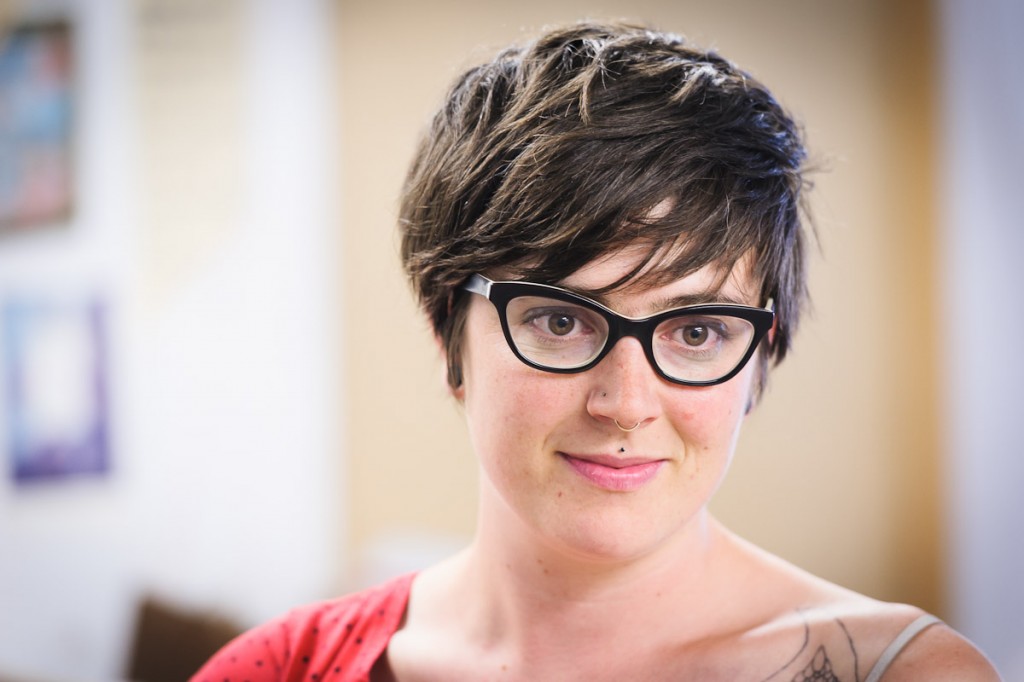
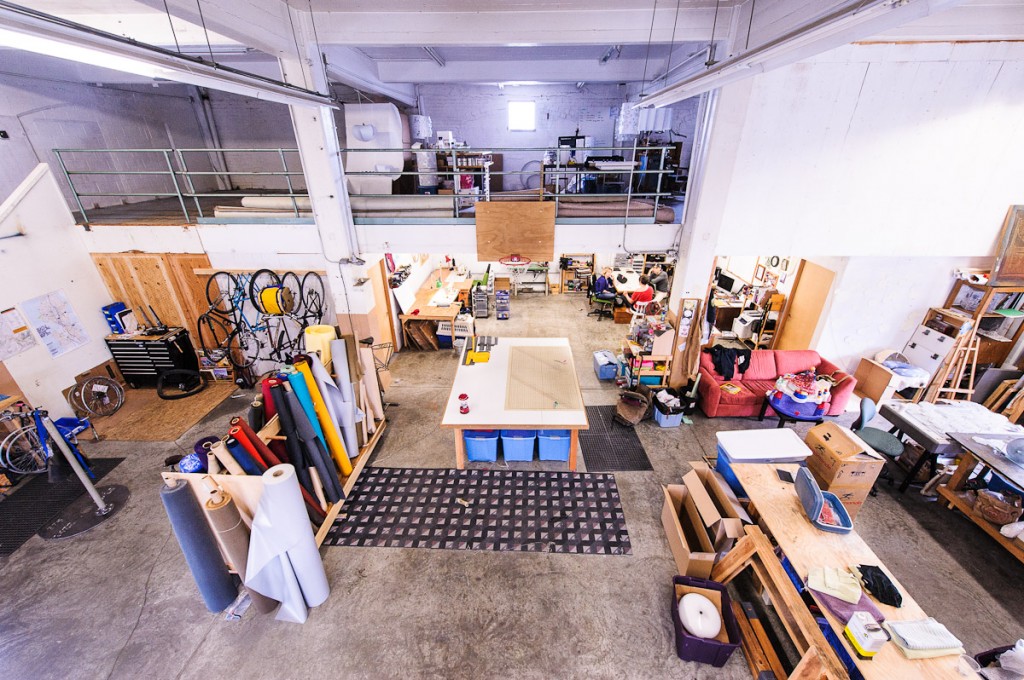
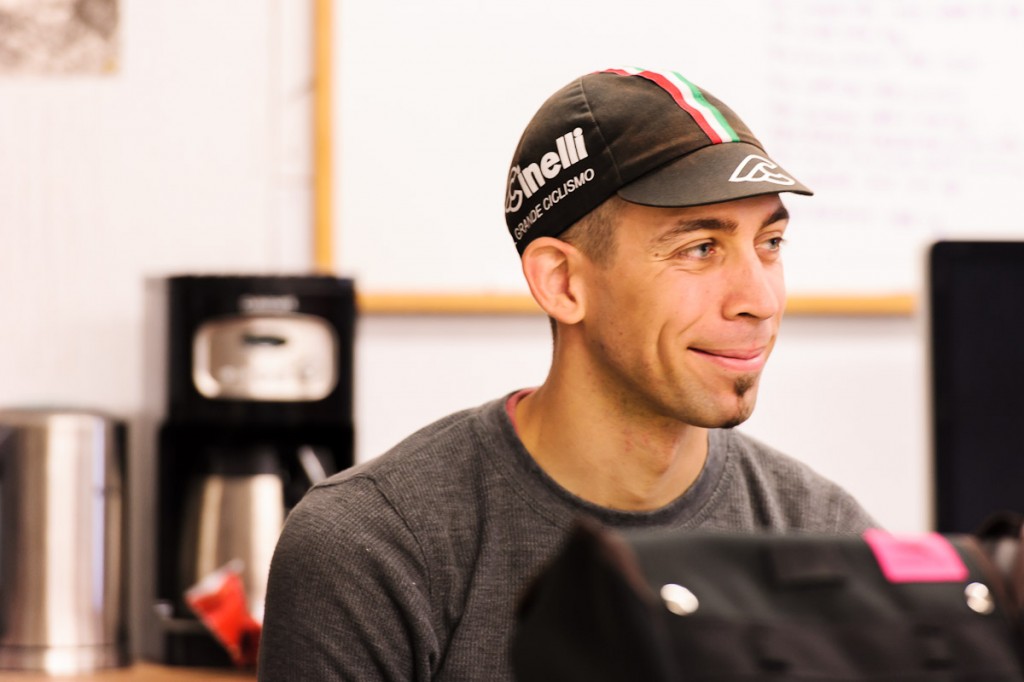
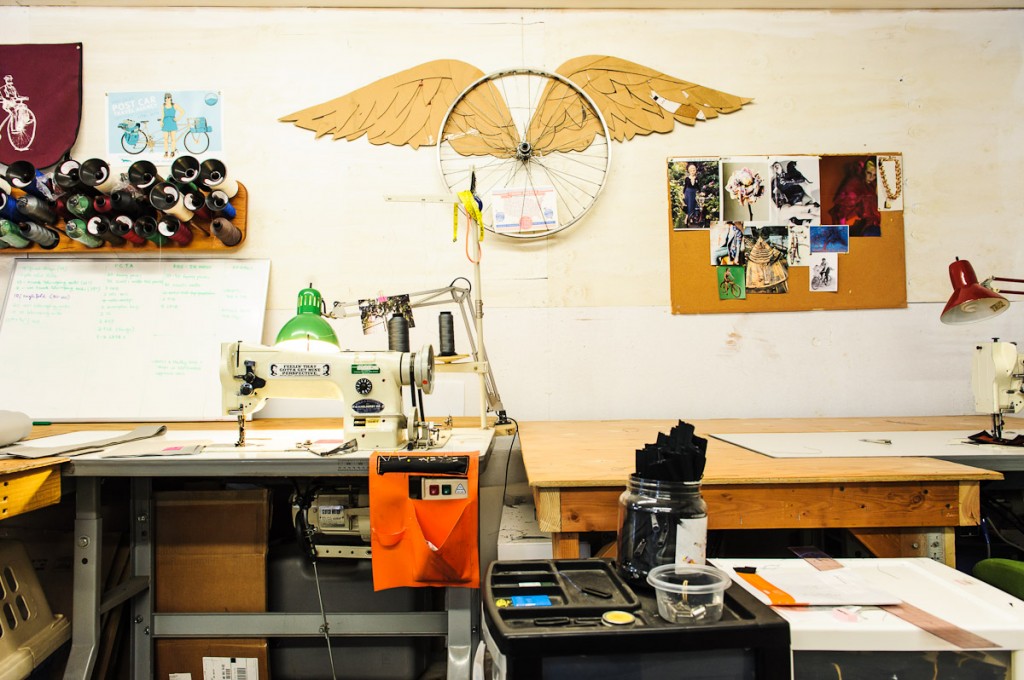
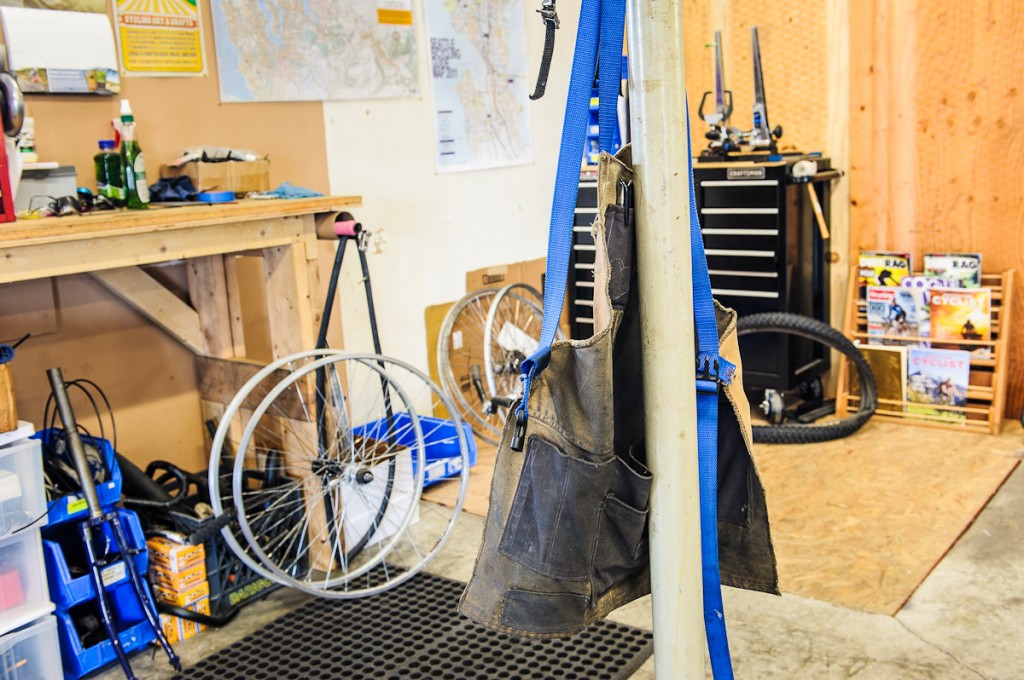
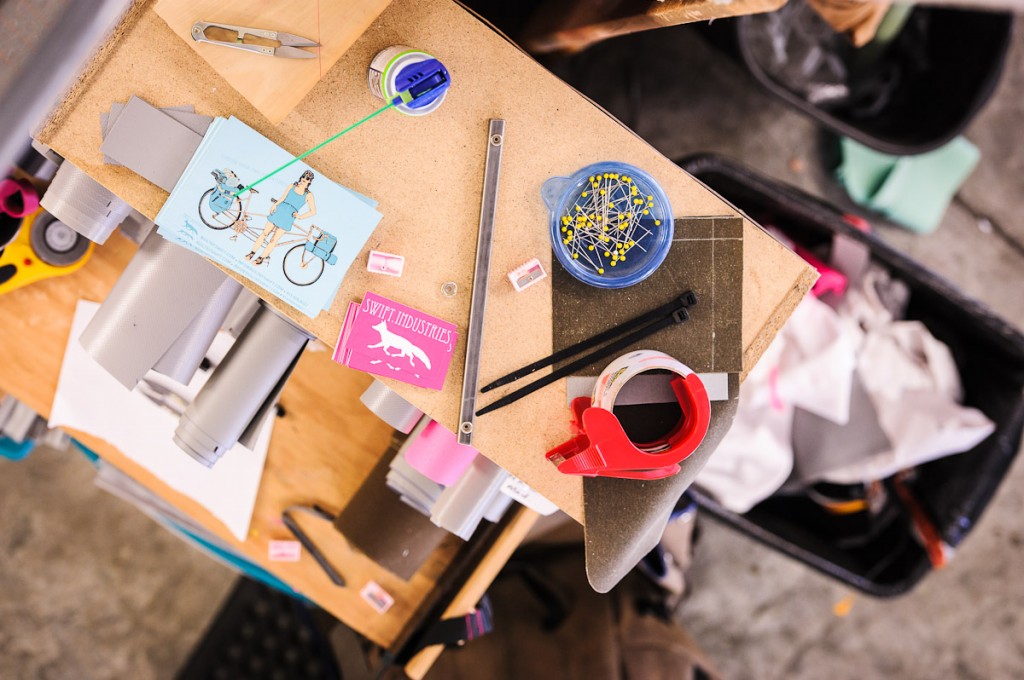
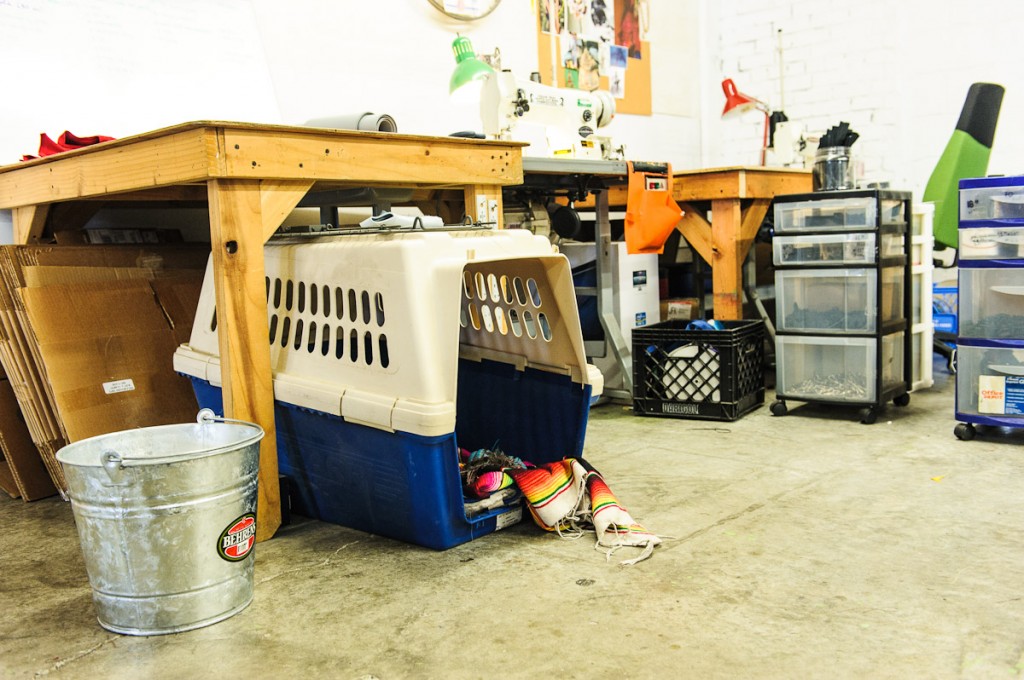
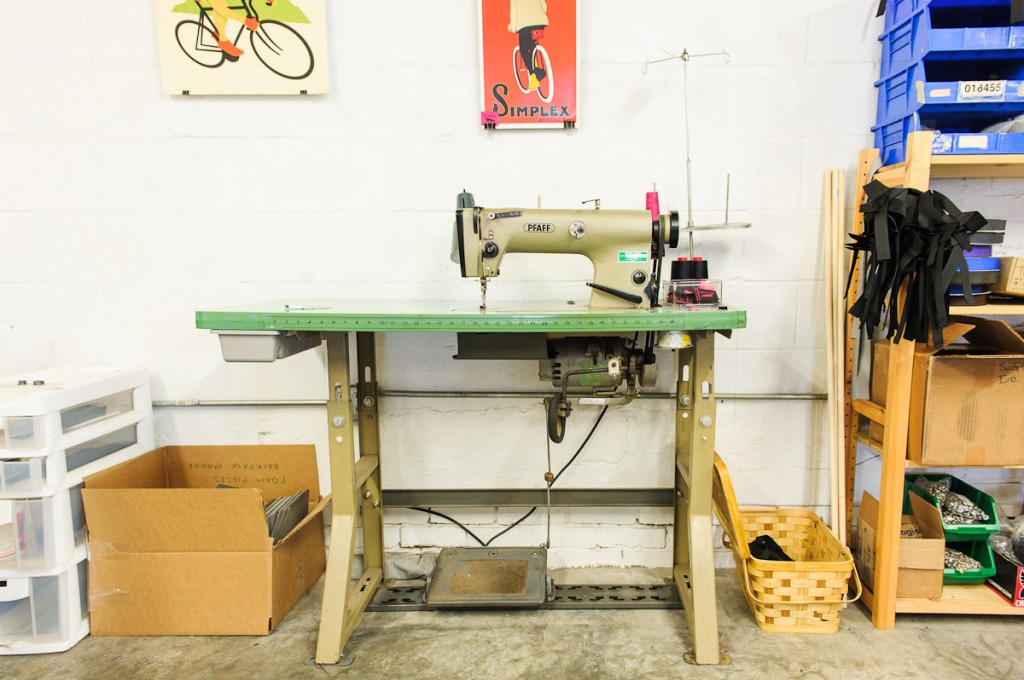
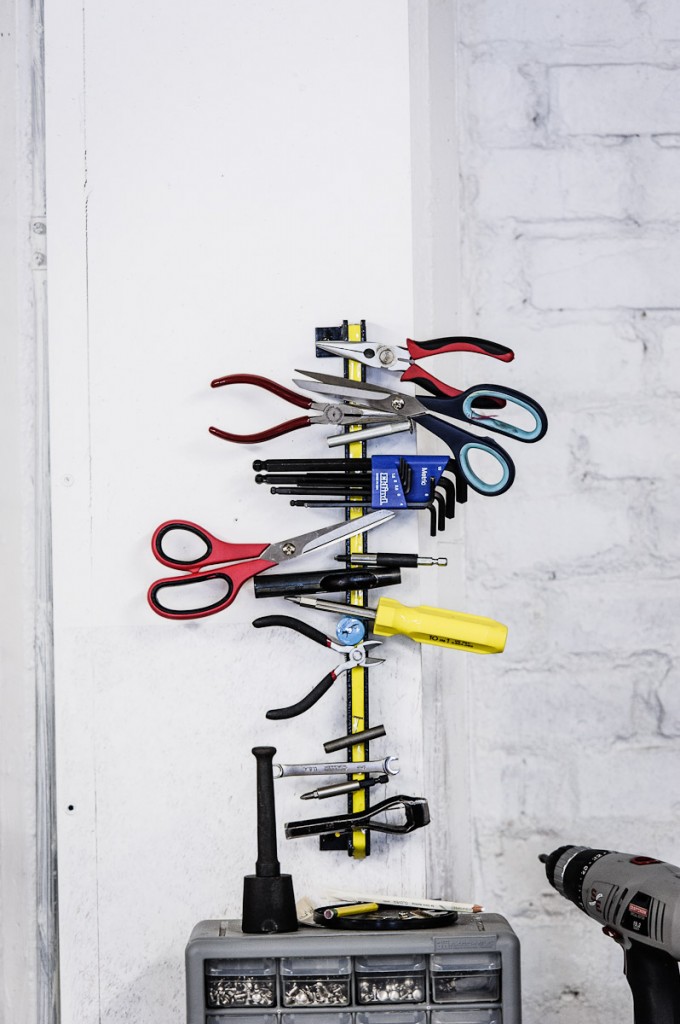
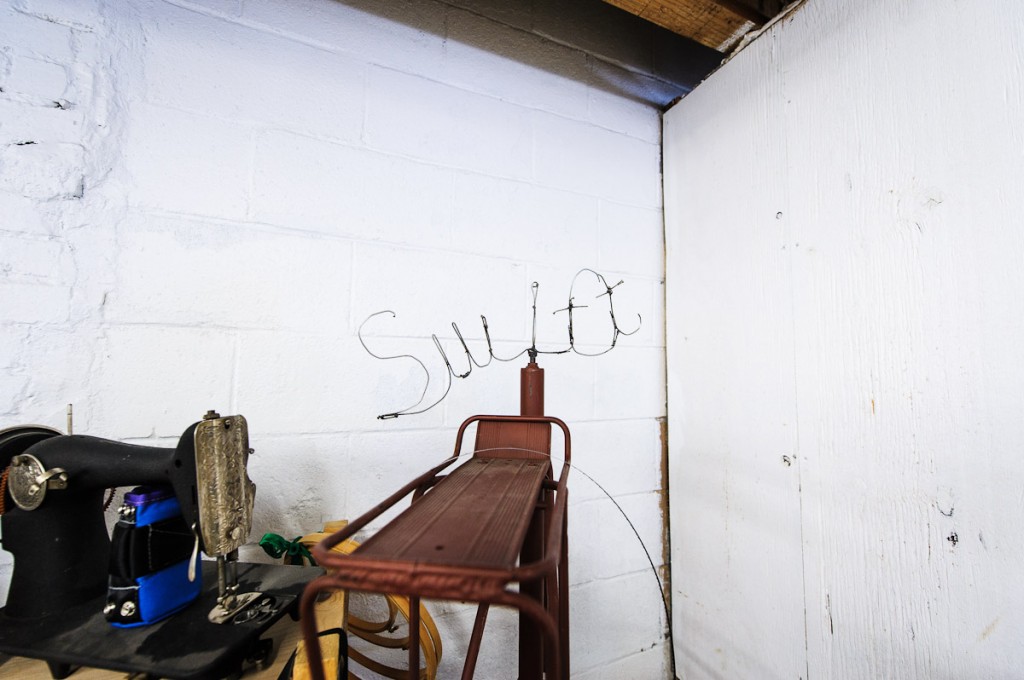
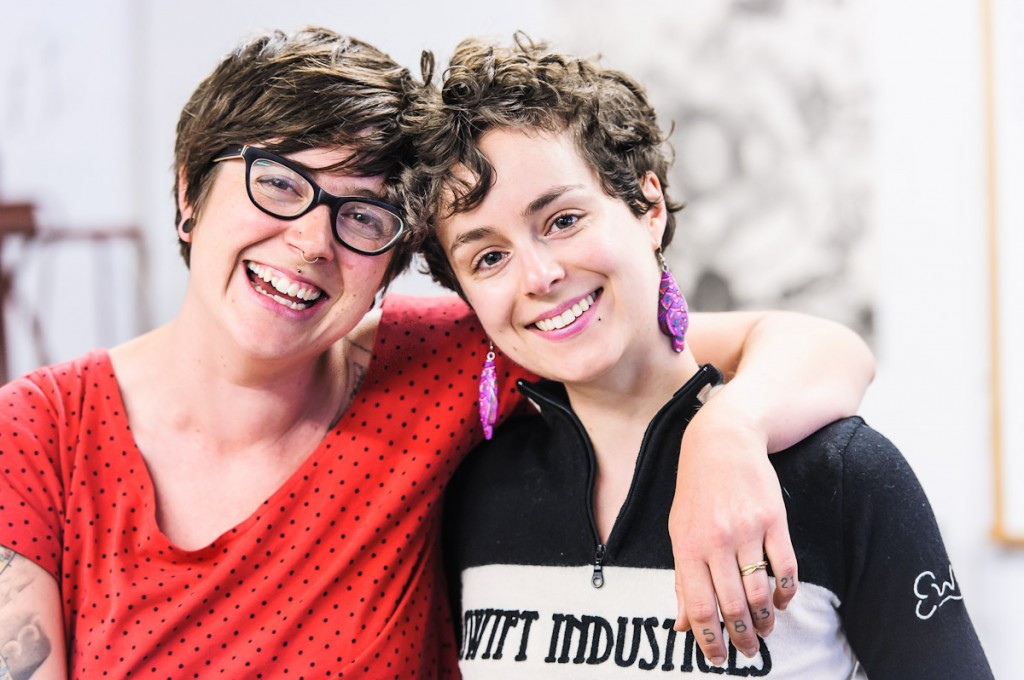
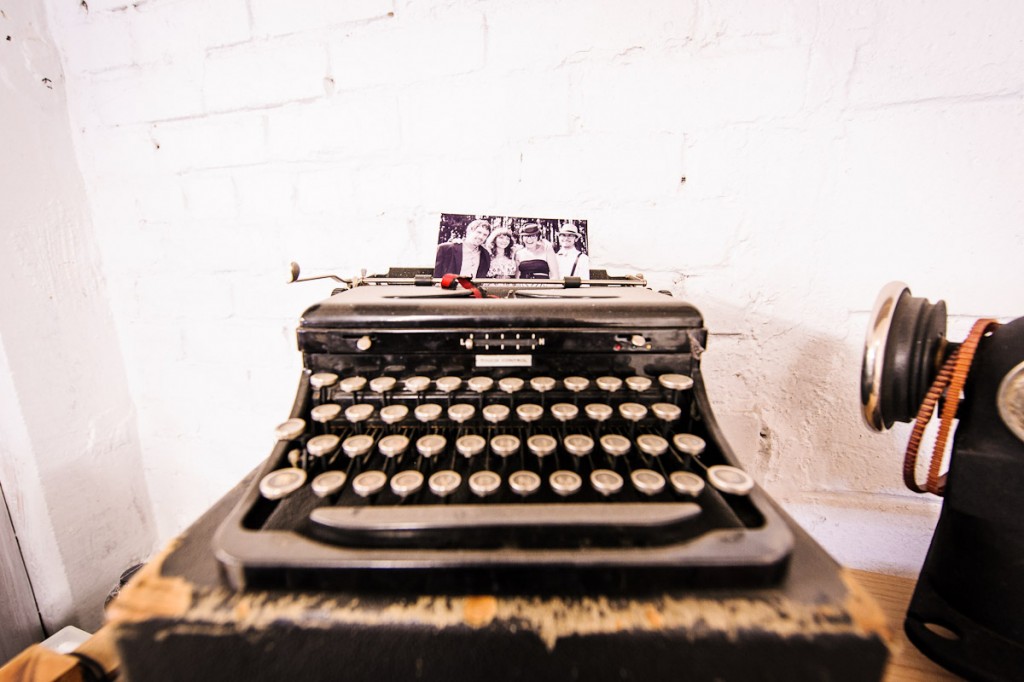
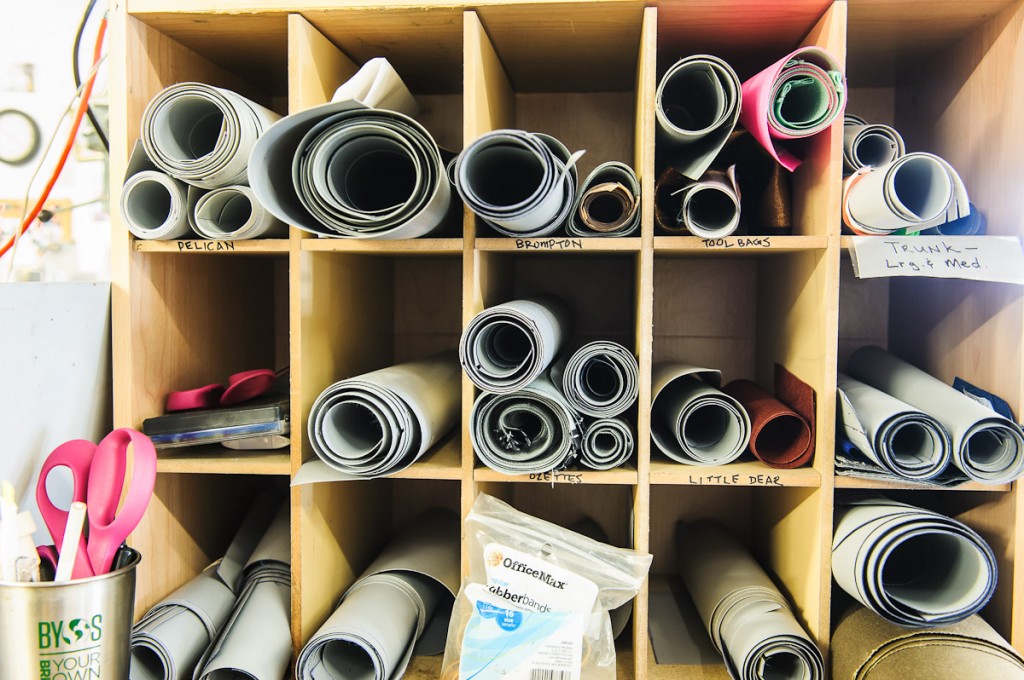
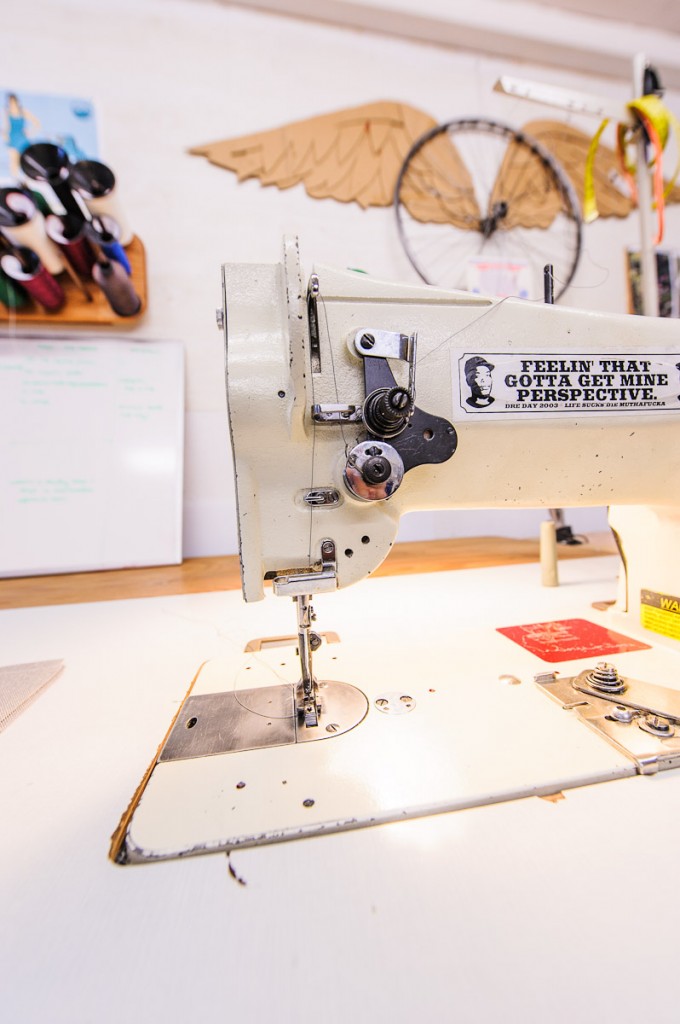
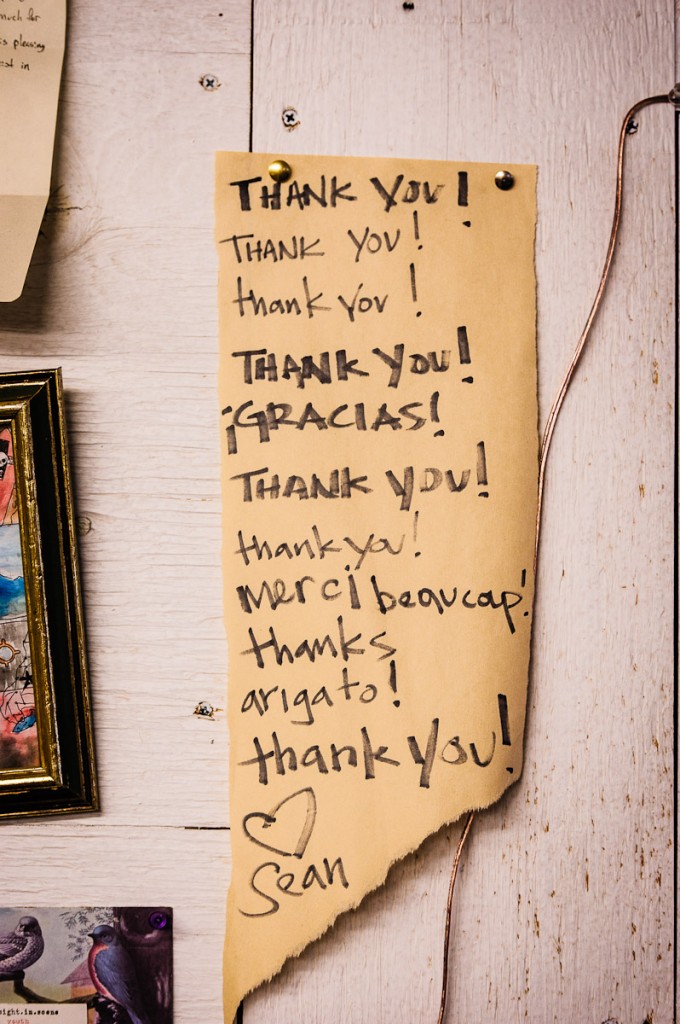
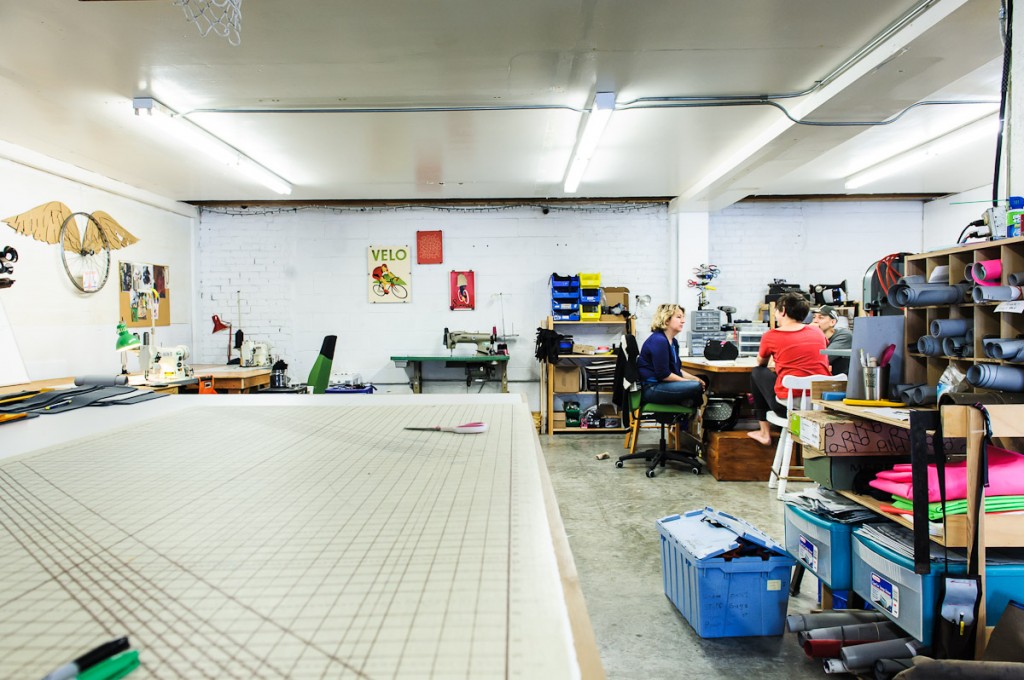
7 responses to “Always in Flux”
[…] at Different Office when our schedules align for some photography for their various stories. This story is from Swift Industries located in the Seattle neighborhood of Ballard. It is an amazing space and […]
[…] flag) for when I’m with someone of my culture. When I’m with Bas, or Haulin Colin, or Martina of Swift Industries, or Del Webber, or Bernie, or Natalie, or Lisa, and so many others, I […]
[…] read more please check out the full post at different office Filed Under: different office, interviews, Uber Local← Bamboo Bicycles: Made in […]
google…
Google http://news.google.com…
[…] a girlfriend, boyfriend, friend, and at least one person is trying to leave the day job. You know, Martina was talking about that for the two of them. You’re financially both there to help as well. One […]
[…] the best. The other thing is, I think you’ve already hit several that I’d recommend, which is Martina, Haulin’ […]
[…] Martina gave us a tour of their entire building–within which Swift Industries is one of many small hand-craft-related businesses–before showing us their space and answering our questions about the space. The conversation and some images from the tour follow. Click here for the interview. […]